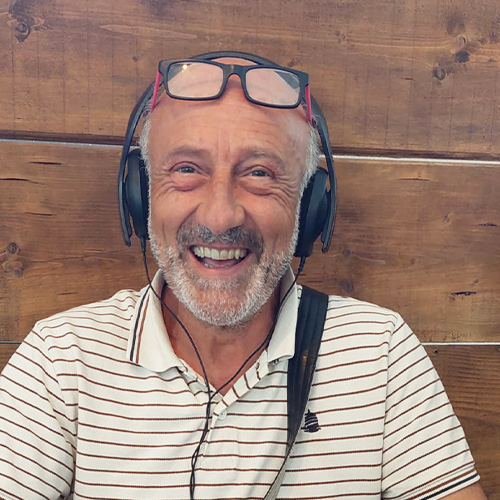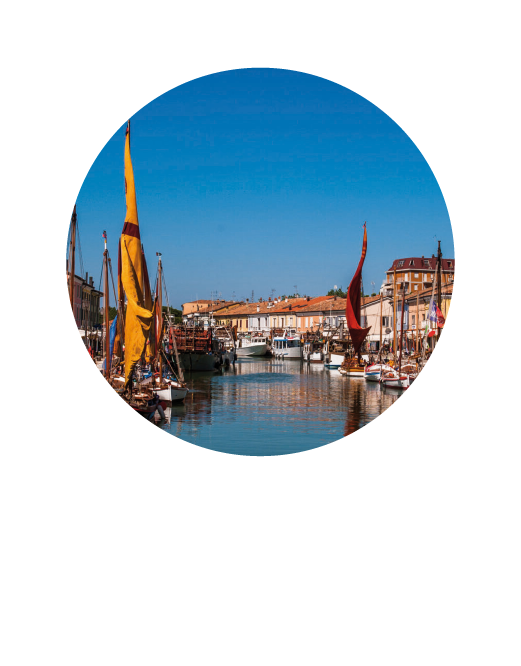

The Boatyard Road, Via Squero
The Boatyard Road, Via Squero
Riproduci traccia audio
Play audio track
Audio-Track abspielen
The Boatyard Road, Via Squero
Trascrizione traccia audio
Sixty years ago, most of Cesenatico’s fishermen lived here in Via Squero, on the west side of town.
This was the poorest area of town, known as the Valona district; the taverns offered only fish, which at the time was considered food for the poor, while in the trattorias beyond the canal and to the east, the menus served meat products from the countryside.
When I was little, Via Squero looked a little bit like the Spanish Quarters of Naples; I remember the scenes, the loud shouting from the windows, the children playing and the laundry lying in the wind to dry.
Today I wonder where the children have gone, I don’t see them anymore. There were twenty or thirty of us, and the street was our playground where you could hear our gleeful voices as we played our games. Then evening would fall, and it was time for the women to take their chairs in the street, chatting until late.
By virtue of its name, Via Squero, meaning “The Boatyard Road”, we are naturally drawn towards the sea. Let’s get going!
If you look up now, you can see the sail-shaped flags hanging from the streetlamps. Each one shows the colours and shapes that helped you recognise the fishing boat it belonged to, but above all written on the flags were the nicknames of the fishing families who owned a boat: Gambèla, E Sèndich, Nacc, Bastcianèl … I only know the origin of a few of them for example Scimiàza, a practical joker who was always ready to play tricks on everyone, like a mischievous monkey.
In the sixties and seventies most of the fishing boats used midwater trawling as a means of fishing for local fish, more commonly known locally as “blue fish”. From four in the morning the road began to come to life: the fishermen came out of their homes dressed ready to go to sea with their fishing clogs, as their boots were already on the boat; in the cold months they wore “scarfaròt”, woollen socks so thick that you could walk outdoors just with them on your feet. Their feet were kept warm, however they were anything but comfortable.
“Come with me you young rascal and help me get the provisions” would cry the cook to the ship’s boy. Here, at number 29 Via Squero, on the corner of Via Semprini, there was a shop where you went to stock up on supplies for the crew. Each grocery store had a booklet in the name of the boat where the expenses were meticulously accounted for, and bills were settled at the end of the month.
A little further on, at number 37, lived my first Captain, nicknamed “the General”: living in a house not far from mine, on the way to the sea he always passed by my home to check that I was up and about. He was a brusque man, and in fact there was little need for too many words between us: fishermen have a jargon where we immediately understand one and other. During the years our relationship became closer and closer as he told me many of his personal stories. They were always about the sea, and they have stayed with me all my life.
And here we are in front of Via Squero 55: this is my home!
My grandfather was a fisherman, my father wasn’t: my grandmother died whilst giving birth to him, and her dying words were a request to her husband to promise her that he would not let his son go to sea.
My grandmother’s request was understandable, in those days a fisherman’s life was dangerous: out on the seas with only sails on the boat, at the mercy of the winds, in the storms as well as the calm; there were thick fogs, collisions between boats and, after 1945, a new threat where the sea was full of mines scattered by the Germans during the war where quite often fishermen would meet their fate.
The fisherman’s life was also poor; he brought home just enough to eat, there was a lot of misery. The work only began to become profitable in the early seventies, thanks to increasingly powerful engines and innovations in fishing techniques. That was the time when many of my peers and I started going to sea.
Whilst growing up my father had told me the promise that my grandfather had made to his wife on her deathbed. When I was a child, he did not like me to go and play with the fishermen’s children, perhaps he feared that sooner or later I, like him, would be fascinated by that world.
However, both my brother and I were always with the fishermen’s children. The sorties on the fishing boats, chasing round the fish warehouses, the swims in the port. Sometimes at night we would wake up and sneak out to the tuna nets. Those nighttime adventures were like a fairy-tale, we would stretch out on the nets, looking up at the starry sky.
Having lived my childhood in the middle of this place, helped me find my way to a life at sea but the thing that really ignited my passion was when I had read Kipling’s Captains Courageous and then saw the film starring Spencer Tracy.
Just a few steps passed my house, on the right, was the little boatyard. Nowadays there is water there, but back then there was sand to pull the boats onto dry land; further on the left was the Marconi shipyard, where the larger boats were built and repaired. Today all the construction work is done at the dock, going beyond Via Squero towards the Marina.
At the corner of the Boatyard was the Mariners Bar, with a large canopy and tables outside. When you couldn’t go out to sea, the fishermen didn’t go home, they came here. If the weather was uncertain, the younger ones would be told “Go to your berth”, a way of telling them to get ready, but quite often we would also end up arriving at the bar. We liked to listen to the stories of the older fishermen. Their tales would tell us of how they had made important navigation decisions for their boats, or of who had spotted the first shoal of fish; sometimes it was about an argument or telling you about a shipwreck or even a practical joke played on a colleague. On other occasions the captains would talk about the catch of the previous day, not quite telling you everything so they would not let on as to where they had really found the fish.
Next to what was once the Mariners Bar there was La Lampara, still there today. For a long time, it was the trendiest place in Cesenatico, it belonged to my father’s uncle and many times and when I was just 4 or 5 years old, they would make me stand on the tables and sing. As a child I was very shy, but when I performed, I turned into another person. My love for singing today goes back to these times. [I sing a piece by Mama Luntèna]
Finally, we find ourselves in front of the Boatyard and its notable headquarters, the Casa del Pescatore, a cooperative founded in 1945. On the top floor there is an important video and photographic archive. The memories, the knowledge and the heritage from our fishing history is still alive and well in the neighbourhood today, but one day it will disappear, and this archive will become an important testimonial telling of our mariner’s past.
I think of my grandfather and of when he retired, taking on the role of one of the first “retai” repairing nets. He was so attached to that world that it was impossible for him to part with it.
Those who went to sea were always drawn back to the port, never able to stay a long way away and always returning.
Audio Track transcription
Sixty years ago, most of Cesenatico’s fishermen lived here in Via Squero, on the west side of town.
This was the poorest area of town, known as the Valona district; the taverns offered only fish, which at the time was considered food for the poor, while in the trattorias beyond the canal and to the east, the menus served meat products from the countryside.
When I was little, Via Squero looked a little bit like the Spanish Quarters of Naples; I remember the scenes, the loud shouting from the windows, the children playing and the laundry lying in the wind to dry.
Today I wonder where the children have gone, I don’t see them anymore. There were twenty or thirty of us, and the street was our playground where you could hear our gleeful voices as we played our games. Then evening would fall, and it was time for the women to take their chairs in the street, chatting until late.
By virtue of its name, Via Squero, meaning “The Boatyard Road”, we are naturally drawn towards the sea. Let’s get going!
If you look up now, you can see the sail-shaped flags hanging from the streetlamps. Each one shows the colours and shapes that helped you recognise the fishing boat it belonged to, but above all written on the flags were the nicknames of the fishing families who owned a boat: Gambèla, E Sèndich, Nacc, Bastcianèl … I only know the origin of a few of them for example Scimiàza, a practical joker who was always ready to play tricks on everyone, like a mischievous monkey.
In the sixties and seventies most of the fishing boats used midwater trawling as a means of fishing for local fish, more commonly known locally as “blue fish”. From four in the morning the road began to come to life: the fishermen came out of their homes dressed ready to go to sea with their fishing clogs, as their boots were already on the boat; in the cold months they wore “scarfaròt”, woollen socks so thick that you could walk outdoors just with them on your feet. Their feet were kept warm, however they were anything but comfortable.
“Come with me you young rascal and help me get the provisions” would cry the cook to the ship’s boy. Here, at number 29 Via Squero, on the corner of Via Semprini, there was a shop where you went to stock up on supplies for the crew. Each grocery store had a booklet in the name of the boat where the expenses were meticulously accounted for, and bills were settled at the end of the month.
A little further on, at number 37, lived my first Captain, nicknamed “the General”: living in a house not far from mine, on the way to the sea he always passed by my home to check that I was up and about. He was a brusque man, and in fact there was little need for too many words between us: fishermen have a jargon where we immediately understand one and other. During the years our relationship became closer and closer as he told me many of his personal stories. They were always about the sea, and they have stayed with me all my life.
And here we are in front of Via Squero 55: this is my home!
My grandfather was a fisherman, my father wasn’t: my grandmother died whilst giving birth to him, and her dying words were a request to her husband to promise her that he would not let his son go to sea.
My grandmother’s request was understandable, in those days a fisherman’s life was dangerous: out on the seas with only sails on the boat, at the mercy of the winds, in the storms as well as the calm; there were thick fogs, collisions between boats and, after 1945, a new threat where the sea was full of mines scattered by the Germans during the war where quite often fishermen would meet their fate.
The fisherman’s life was also poor; he brought home just enough to eat, there was a lot of misery. The work only began to become profitable in the early seventies, thanks to increasingly powerful engines and innovations in fishing techniques. That was the time when many of my peers and I started going to sea.
Whilst growing up my father had told me the promise that my grandfather had made to his wife on her deathbed. When I was a child, he did not like me to go and play with the fishermen’s children, perhaps he feared that sooner or later I, like him, would be fascinated by that world.
However, both my brother and I were always with the fishermen’s children. The sorties on the fishing boats, chasing round the fish warehouses, the swims in the port. Sometimes at night we would wake up and sneak out to the tuna nets. Those nighttime adventures were like a fairy-tale, we would stretch out on the nets, looking up at the starry sky.
Having lived my childhood in the middle of this place, helped me find my way to a life at sea but the thing that really ignited my passion was when I had read Kipling’s Captains Courageous and then saw the film starring Spencer Tracy.
Just a few steps passed my house, on the right, was the little boatyard. Nowadays there is water there, but back then there was sand to pull the boats onto dry land; further on the left was the Marconi shipyard, where the larger boats were built and repaired. Today all the construction work is done at the dock, going beyond Via Squero towards the Marina.
At the corner of the Boatyard was the Mariners Bar, with a large canopy and tables outside. When you couldn’t go out to sea, the fishermen didn’t go home, they came here. If the weather was uncertain, the younger ones would be told “Go to your berth”, a way of telling them to get ready, but quite often we would also end up arriving at the bar. We liked to listen to the stories of the older fishermen. Their tales would tell us of how they had made important navigation decisions for their boats, or of who had spotted the first shoal of fish; sometimes it was about an argument or telling you about a shipwreck or even a practical joke played on a colleague. On other occasions the captains would talk about the catch of the previous day, not quite telling you everything so they would not let on as to where they had really found the fish.
Next to what was once the Mariners Bar there was La Lampara, still there today. For a long time, it was the trendiest place in Cesenatico, it belonged to my father’s uncle and many times and when I was just 4 or 5 years old, they would make me stand on the tables and sing. As a child I was very shy, but when I performed, I turned into another person. My love for singing today goes back to these times. [I sing a piece by Mama Luntèna]
Finally, we find ourselves in front of the Boatyard and its notable headquarters, the Casa del Pescatore, a cooperative founded in 1945. On the top floor there is an important video and photographic archive. The memories, the knowledge and the heritage from our fishing history is still alive and well in the neighbourhood today, but one day it will disappear, and this archive will become an important testimonial telling of our mariner’s past.
I think of my grandfather and of when he retired, taking on the role of one of the first “retai” repairing nets. He was so attached to that world that it was impossible for him to part with it.
Those who went to sea were always drawn back to the port, never able to stay a long way away and always returning.
Audiotrack-Text
Sixty years ago, most of Cesenatico’s fishermen lived here in Via Squero, on the west side of town.
This was the poorest area of town, known as the Valona district; the taverns offered only fish, which at the time was considered food for the poor, while in the trattorias beyond the canal and to the east, the menus served meat products from the countryside.
When I was little, Via Squero looked a little bit like the Spanish Quarters of Naples; I remember the scenes, the loud shouting from the windows, the children playing and the laundry lying in the wind to dry.
Today I wonder where the children have gone, I don’t see them anymore. There were twenty or thirty of us, and the street was our playground where you could hear our gleeful voices as we played our games. Then evening would fall, and it was time for the women to take their chairs in the street, chatting until late.
By virtue of its name, Via Squero, meaning “The Boatyard Road”, we are naturally drawn towards the sea. Let’s get going!
If you look up now, you can see the sail-shaped flags hanging from the streetlamps. Each one shows the colours and shapes that helped you recognise the fishing boat it belonged to, but above all written on the flags were the nicknames of the fishing families who owned a boat: Gambèla, E Sèndich, Nacc, Bastcianèl … I only know the origin of a few of them for example Scimiàza, a practical joker who was always ready to play tricks on everyone, like a mischievous monkey.
In the sixties and seventies most of the fishing boats used midwater trawling as a means of fishing for local fish, more commonly known locally as “blue fish”. From four in the morning the road began to come to life: the fishermen came out of their homes dressed ready to go to sea with their fishing clogs, as their boots were already on the boat; in the cold months they wore “scarfaròt”, woollen socks so thick that you could walk outdoors just with them on your feet. Their feet were kept warm, however they were anything but comfortable.
“Come with me you young rascal and help me get the provisions” would cry the cook to the ship’s boy. Here, at number 29 Via Squero, on the corner of Via Semprini, there was a shop where you went to stock up on supplies for the crew. Each grocery store had a booklet in the name of the boat where the expenses were meticulously accounted for, and bills were settled at the end of the month.
A little further on, at number 37, lived my first Captain, nicknamed “the General”: living in a house not far from mine, on the way to the sea he always passed by my home to check that I was up and about. He was a brusque man, and in fact there was little need for too many words between us: fishermen have a jargon where we immediately understand one and other. During the years our relationship became closer and closer as he told me many of his personal stories. They were always about the sea, and they have stayed with me all my life.
And here we are in front of Via Squero 55: this is my home!
My grandfather was a fisherman, my father wasn’t: my grandmother died whilst giving birth to him, and her dying words were a request to her husband to promise her that he would not let his son go to sea.
My grandmother’s request was understandable, in those days a fisherman’s life was dangerous: out on the seas with only sails on the boat, at the mercy of the winds, in the storms as well as the calm; there were thick fogs, collisions between boats and, after 1945, a new threat where the sea was full of mines scattered by the Germans during the war where quite often fishermen would meet their fate.
The fisherman’s life was also poor; he brought home just enough to eat, there was a lot of misery. The work only began to become profitable in the early seventies, thanks to increasingly powerful engines and innovations in fishing techniques. That was the time when many of my peers and I started going to sea.
Whilst growing up my father had told me the promise that my grandfather had made to his wife on her deathbed. When I was a child, he did not like me to go and play with the fishermen’s children, perhaps he feared that sooner or later I, like him, would be fascinated by that world.
However, both my brother and I were always with the fishermen’s children. The sorties on the fishing boats, chasing round the fish warehouses, the swims in the port. Sometimes at night we would wake up and sneak out to the tuna nets. Those nighttime adventures were like a fairy-tale, we would stretch out on the nets, looking up at the starry sky.
Having lived my childhood in the middle of this place, helped me find my way to a life at sea but the thing that really ignited my passion was when I had read Kipling’s Captains Courageous and then saw the film starring Spencer Tracy.
Just a few steps passed my house, on the right, was the little boatyard. Nowadays there is water there, but back then there was sand to pull the boats onto dry land; further on the left was the Marconi shipyard, where the larger boats were built and repaired. Today all the construction work is done at the dock, going beyond Via Squero towards the Marina.
At the corner of the Boatyard was the Mariners Bar, with a large canopy and tables outside. When you couldn’t go out to sea, the fishermen didn’t go home, they came here. If the weather was uncertain, the younger ones would be told “Go to your berth”, a way of telling them to get ready, but quite often we would also end up arriving at the bar. We liked to listen to the stories of the older fishermen. Their tales would tell us of how they had made important navigation decisions for their boats, or of who had spotted the first shoal of fish; sometimes it was about an argument or telling you about a shipwreck or even a practical joke played on a colleague. On other occasions the captains would talk about the catch of the previous day, not quite telling you everything so they would not let on as to where they had really found the fish.
Next to what was once the Mariners Bar there was La Lampara, still there today. For a long time, it was the trendiest place in Cesenatico, it belonged to my father’s uncle and many times and when I was just 4 or 5 years old, they would make me stand on the tables and sing. As a child I was very shy, but when I performed, I turned into another person. My love for singing today goes back to these times. [I sing a piece by Mama Luntèna]
Finally, we find ourselves in front of the Boatyard and its notable headquarters, the Casa del Pescatore, a cooperative founded in 1945. On the top floor there is an important video and photographic archive. The memories, the knowledge and the heritage from our fishing history is still alive and well in the neighbourhood today, but one day it will disappear, and this archive will become an important testimonial telling of our mariner’s past.
I think of my grandfather and of when he retired, taking on the role of one of the first “retai” repairing nets. He was so attached to that world that it was impossible for him to part with it.
Those who went to sea were always drawn back to the port, never able to stay a long way away and always returning.
Narrato da
Narrated by
Mehr Infos



